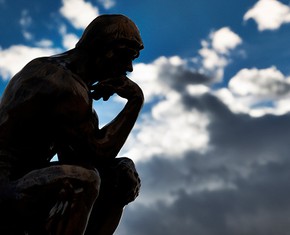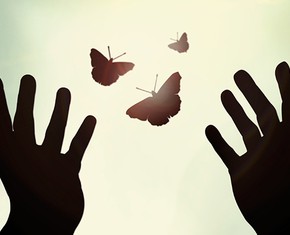The views expressed in our content reflect individual perspectives and do not represent the authoritative views of the Baha'i Faith.
Do you believe in the struggle for existence? Competition? The survival of the fittest?
These days, most people do. Darwin, Hobbes, Malthus and Benjamin Franklin certainly did. In fact, thanks to those four men and a few others, the concept of the struggle for existence now pervades most modern thinking, at least in the Western world. It has become so much a part of our consciousness that many people now treat the survival of the fittest as one of the unbreakable laws of nature. It famously provides the centerpiece of Darwin’s theory of evolution in Chapter Three of his book The Origin of Species:
A struggle for existence inevitably follows from the high rate at which all organic beings tend to increase [so that] on the principle of geometrical increase, its numbers would quickly become so inordinately great that no country could support the product. Hence, as more individuals are produced than can possibly survive, there must in every case be a struggle for existence, either one individual with another of the same species, or with the individuals of distinct species, or with the physical conditions of life. – Darwin, Origin of Species, pp. 60-61.
It might surprise you to learn that Darwin didn’t invent this idea—it came from Rennaisance and Enlightenment thinkers like Thomas Hobbes, who wrote in his essay Leviathan that existence is “bellum omnium contra omnes,” Latin for “the war of all against all.” In an equally influential work called An Essay on the Principle of Population, Thomas Robert Malthus first drew the famous Malthusian Curve—which purports to show that living populations tend to increase exponentially if unchecked, quickly outstripping the available resources. Malthus originally theorized that the planet’s finite resources will always require us to compete with each other to exist and survive.
These ideas have become incredibly powerful—and so widely believed that many of us now accept competition and the struggle for existence as part of our inherent human condition. Entire cultures and systems, like the capitalist economies so pervasive around the world today, hinge on these basic philosophical building blocks of survival, struggle and competitiveness. In our aggressive cultural insistence on the survival of the fittest, we even teach our children to compete from a very young age:
Commonly held and pervasive patterns of thought are part of the character of any society. Ways of thinking about life that are common to a culture — its well-worn mental habits — have a deep influence on what a society does and how people act. For example, a society that holds the belief that life is a competitive struggle for existence will organize its economy, its educational system, its social services and its provision for security in very different ways from a society that holds the belief that mutual service and reciprocity are essential characteristics of living beings. The conviction that humans are merely sophisticated animals leads to principles of commerce, government and law that are very different from those that flow from the conviction that human beings have a capacity to reflect the qualities of God, which can only unfold through a conscious act of will. Ideas — bad ones as well as good ones — are expressed in the structures and patterns of a society. – Hooper Dunbar, Forces of Our Time, p. 27.
 But what if those widely-accepted social theories are too simplistic–or just plain wrong? What if the survival of the fittest doesn’t fit any more? What about the recent discoveries that have modified and changed the entire idea of the struggle for existence, and what if our thinking just hasn’t caught up with those discoveries yet?
But what if those widely-accepted social theories are too simplistic–or just plain wrong? What if the survival of the fittest doesn’t fit any more? What about the recent discoveries that have modified and changed the entire idea of the struggle for existence, and what if our thinking just hasn’t caught up with those discoveries yet?
In this series of essays, we’ll take a careful look at this fundamental concept of the human struggle for existence. We’ll start with nature, at the individual level, then investigate animal and human societies to see if the same hypothesis applies there. We’ll consider why many modern scientists have now supplanted or replaced the conceptual framework of the survival of the fittest with another, even more fascinating way of understanding the complex processes of life. We’ll examine the emerging knowledge about how environments and ecosystems work, and see how survival of the fittest applies in those disciplines. Most importantly, we’ll explore what all of this has to do with our spiritual lives, and consider the Baha’i view of this near-universal concept of scarcity, survival and competition.
Briefly, Baha’is look at the idea of the survival of the fittest as a valid scientific theory that holds true for most of the natural world—but that does not always apply to the human world. Baha’is believe that human beings can transcend the natural law of the survival of the fittest, and actually build a cooperative, unified and synergistic society that benefits all people. The Baha’i teachings say that:
The mass of the people are occupied with self and worldly desire, are immersed in the ocean of the nether world and are captives of the world of nature, save those souls who have been freed from the chains and fetters of the material world and, like unto swift-flying birds, are soaring in this unbounded realm. They are awake and vigilant, they shun the obscurity of the world of nature, their highest wish centereth on the eradication from among men of the struggle for existence, the shining forth of the spirituality and the love of the realm on high, the exercise of utmost kindness among peoples, the realization of an intimate and close connection between religions and the practice of the ideal of self-sacrifice. Then will the world of humanity be transformed into the Kingdom of God. – Abdu’l-Baha, Selections from the Writings of Abdu’l-Baha, p. 281.
In the world of nature we behold the living organisms in a ceaseless struggle for existence. Everywhere we are confronted by evidences of the physical survival of the fittest. This is the very source of error and misapprehension in the opinions and theories of men who fail to realize that the world of nature is inherently defective in cause and outcome and that the defects therein must be removed by education. – Abdu’l-Baha, The Promulgation of Universal Peace, p. 397.
We invite you to follow along in this series of essays, as we seek to grasp the current science on evolution, examine its direct relevance to our lives and try to understand what it means for our souls.
You May Also Like
Comments

















Once we realize that our journey as humans on this planet is just a brief moment in our spiritual cosmic journey we will stop to struggle for existence on this planet alone and will make it a beautiful visiting spot for all of us as we go about our spiritual cosmic voyage. Struggle arises when there is lack of knowledge of the abundance that there is out there in the cosmos beyond the human life on this planet. Those who struggle and fight for the limited resources on this planet will be born again ...and again in this realm and will keep struggling until they break free from the illusion that this is the only way of life. For those who are free, there is no more struggle and they are just compassionate to those who are struggling and will try to set them free with their knowledge and love.
Love,
Sridattadev.